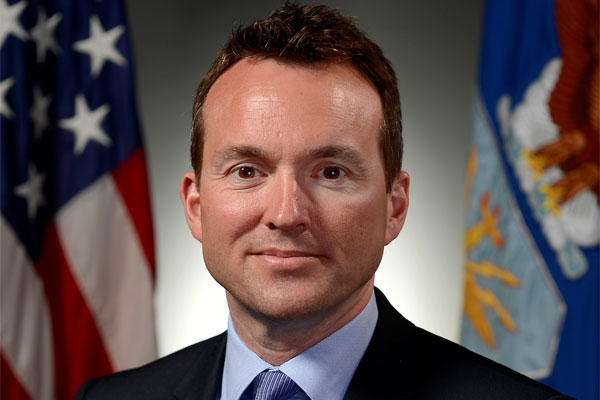Defense Secretary Ashton Carter last week named Eric Fanning as acting Army undersecretary, making him the frontrunner to become Army Secretary and the first openly gay military service secretary.
In a statement last week, Defense Secretary Ashton Carter left little doubt that the 47-year-old Fanning, who now serves as Carter's chief of staff, would be recommended to President Obama for the nomination when current Army Secretary John McHugh retires in the fall.
Carter said that Fanning's "deep well of knowledge and vast experience in the Pentagon, honed during his tenure as deputy undersecretary of the Navy and acting secretary of the Air Force, have been crucial assets for my front office."
"He has also helped me build an outstanding team of civilian and military leaders across the Pentagon. Working with him closely over the last several months, I've seen first-hand why he is one of the most respected appointees in the Obama administration," Carter said.
Fanning, who was born in Michigan, does not have military service. In the 1990s, he was on the staff of the House Armed Services Committee and later served as associate director of political affairs in the administration of former President Bill Clinton.
At the Pentagon, he is known for his quick wit. At a gay rights Pentagon event shortly after he was named acting Air Force Secretary in February, Fanning joked that he wanted to dispel rumors that he would order all the planes painted pink.
The Washington Blade, a newspaper that focuses on gay community issues, cited a senior defense official as saying that Fanning's appointment made him the leading candidate to become Army secretary.
In announcing Fanning's appointment, Carter also said that he was naming current deputy chief of staff, Eric Rosenbach, to take over as his chief of staff. Carter called Rosenbach the "principal architect of DoD's cyber policy."
Rosenbach, a former Army captain and intelligence officer, previously was at the Harvard Kennedy School as the executive director of the Belfer Center for International Affairs.
At the Pentagon, Rosenbach has been an advocate of hitting back against cyber attacks. In testimony to the Senate Armed Services Committee in April, Rosenbach said that "the U.S. must increase the cost of executing a cyberattack. In this regard, DoD must be able to provide the president with options to respond to cyberattacks on the U.S., if required, through cyber and other means."
"Eric brings the right blend of strategic acumen, technological expertise, and managerial skill to help me lead the department during an important time in its history," Carter said.
Since his own confirmation as defense secretary last February, Carter has overseen significant turnover in the Pentagon's top leadership.
McHugh will be departing as Army secretary this fall along with Army Chief of Staff Gen. Ray Odierno. On Carter's recommendation, Obama has selected Gen. Mark A. Milley, who heads U.S. Army Forces Command.
This Thursday, the Senate Armed Services Committee will hold a confirmation hearing for Marine Commandant Gen. Joseph Dunford to succeed Army Gen. Martin Dempsey as Joint Chiefs Chairman.
In choosing Dunford, Obama also named Air Force Gen. Paul Selva, head of U.S. Transportation Command, to replace retiring Adm. James "Sandy" Winnefeld as vice chairman of the Joint Chiefs of Staff.
Last week, Carter made the surprise announcement that Marine Lt. Gen. Robert Neller had been chosen to replace Dunford as Marine Commandant. Neller was named over several more senior officers.
Last month, Carter announced that Adm. John Richardson, a submariner and director of the Naval Nuclear Propulsion Program, had been selected to succeed the retiring Adm. Jonathan Greenert as chief of Naval Operations.
Carter has yet to recommend a replacement for Air Force Chief of Staff Gen. Mark Welsh, who also was expected to retire in the fall. Welsh had been considered a leading contender to replace Dempsey until Dunford's selection was announced.
-- Richard Sisk can be reached at richard.sisk@military.com





























